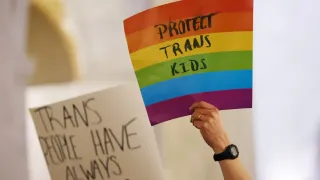August 19, 2020
Prosecutor Faces Scrutiny from Voters, Panel Over Smollett
Michael Tarm READ TIME: 4 MIN.
Chicago's top prosecutor isn't clear of the yearlong scrutiny of her office's handling of the Jussie Smollett case, even though a special prosecutor this week concluded that nothing she or her staff did qualified as criminal.
While stopping short of alleging criminal behavior, special prosecutor Dan Webb said Cook County State's Attorney Kim Foxx and her staff abused their discretion and misled the public before and after tossing charges that accused the former "Empire" actor of staging a racist, anti-gay attack against himself in January 2019.
Webb restored the charges against Smollett earlier this year, but no trial date has been set as the pandemic has stalled Illinois court proceedings.
Foxx, 48, the first Black woman to serve in her post, is seeking a second four-year term in November. Here's a look at the possible implications of Webb's findings concerning her office:
Q:WHAT WERE THE MAIN CRITICISMS OF FOXX?
A: The most serious accusations leveled by Webb, a former U.S. attorney, was that Foxx and a top deputy made at least six false statements regarding the Smollett case.
Foxx said publicly she had stopped communicating with a Smollett relative after doubts began to arise about his attack claims. But Webb found Foxx continued to communicate with the relative, the actor's sister. Webb did say, however, that he found no evidence Foxx's communications with the sister and others outside the office influenced the decision to drop charges.
Foxx also said publicly that the dropping of charges against Smollett was the kind of thing prosecutors had done thousands of times before. In a 12-page Monday statement summarizing his conclusions, Webb said "there were not thousands" or "arguably any" similar such cases.
Webb accused Foxx of also making false public statements in explaining why she recused herself from the Smollett investigation weeks after the actor filed what authorities say was a false police report.
Q: HOW DOES THE DISCIPLINARY BODY COME INTO IT?
A: The false statements may have violated professional codes of conduct, including those that prohibit lawyers from engaging in "conduct involving dishonesty, fraud, deceit, or misrepresentation," Webb said Monday.
He said he was obliged to forward the allegations about the false statements to the Illinois Attorney Registration & Disciplinary Commission, an agency overseen by the Illinois Supreme Court that assesses whether lawyers violated ethical and regulatory norms.
The ARDC only confirms it is looking into allegations after it formally accuses a lawyer of wrongdoing. Any such decision can take months.
Q: IF THE COMMISSION FINDS A VIOLATION, COULD FOXX LOSE HER LAW LICENSE?
A: Disbarment or a temporary suspension of Foxx's law license would be highly unlikely, even if it's a theoretical possibility should the ARDC ever conclude Foxx violated rules of conduct.
Chicago-based attorney Daniel Meyer, who has represented prosecutors accused of wrongdoing before the ARDC, says any discipline against a prosecutor for public comments would be unusual.
"In almost all instances, (disciplinary commission) charges brought against a prosecutor relate to the manner in which he or she prosecuted an actual case," Meyer said, citing examples such as trying to bury evidence that could help the defense. Foxx isn't accused of anything as serious.
If the body concludes she did violate ethical rules, a less severe reprimand or censure would also be a possibility. The state's highest court makes the final determination on punishments.
Q: DO THE FINDINGS PUT HER REELECTION PROSPECTS AT RISK?
A: Probably not. Foxx is a Democrat in an overwhelmingly Democratic city. And Chicago Democrats who win their primary races almost always go on to win the general election. The last Republican Cook County state's attorney was Jack O'Malley, who was defeated by Democrat Dick Devine in 1996.
Even before the special prosecutor's findings were released Monday, the GOP candidate for Cook County state's attorney, former county Judge Pat O'Brien, sought to make Smollett a campaign issue. He said at a news conference in March that Foxx's handling of the case demonstrated her "lack of integrity."
But it seems unlikely such attacks will work. Her challengers in the Democratic primary also made the Smollett case a central line of attack. Foxx ended up winning the race handily, with just over 50 percent of the vote. The remainder of the vote was split between two challengers.
With many voting groups, Foxx remains popular for having adopted criminal justice reforms long before recent nationwide protests demanding reforms.
Her policy changes included a decision to treat certain nonviolent crimes, such as shoplifting, as lower priorities. That change angered Chicago's police union and chiefs of police across Cook County, but it solidified Foxx's support among reform advocates.
Q: HOW HAS FOXX RESPONDED?
A: She hasn't said much yet. A brief statement from Foxx's office Monday said it welcomed Webb's findings that no one on the staff committed a crime and that no outside influence affected prosecutors' charging decisions.
But it added it "categorically rejects ... characterizations of its exercises of prosecutorial discretion and private or public statements as 'abuses of discretion' or false statements to the public."






